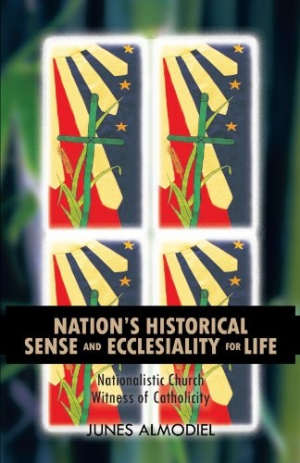Nation's Historical Sense and Ecclesiality for Life
Nationalistic Church Witness of Catholicity
“Some people have no idea how it feels to be treated as nothing (like Israelites in Egypt, or Filipinos under Spanish/Vatican/American rule) by people who think they are superior,” writes Junes Almodiel in his book on the rise and continuing struggle of the Philippine Independent Church. “They come to you, grab their Bible, and then offer you their dogma or doctrine,” writes the author, an ordained priest on a quest to find God, faith, pride, and an understanding of what it means to be Filipino.
The mix of history, theology, political science, and personal experiences and beliefs that the author includes in his book makes it very hard to categorize Nation’s Historical Sense and Ecclesiality for Life. The chapters on the historical role of the Philippine church as the “light bearer” for the national identity of an oppressed people are solidly, if a bit awkwardly, written. The chapters dealing with theological matters are written with feeling, but lack focus.
Almodiel offers a condensed but solid history of the struggle for freedom by the people of the Philippines against their Spanish and, later, American colonial overlords. His report that Filipinos looked to the Americans as liberators from the Spaniards only to become subjects of a new commercial imperialism will come as an uncomfortable revelation to many in the United States. Most Catholics may be surprised at Almodiel’s exposure of the Vatican’s collusion in repressing Philippine independence movements. The church’s betrayal is the more painful, explains the author, who describes in great and sad detail the abuses of four centuries of what he calls “friarocracy.” While Almodiel notes that Pope John Paul II and the Vatican publicly apologized for the church’s transgressions, he remains unconvinced of the sincerity of the apology.
The content and points of view expressed by Almodiel may and should shock most American readers. He is honest, forthright, and passionate. And he is biased, but his is the bias of the oppressed, of the disenfranchised; it is the bias of someone from a country denied its national identity. Almodiel makes a strong case that his church is one way for Filipinos to reclaim their national as well as moral soul.
For all the strong emotions, good history, and solid journalism of his book, the author should be commended. However, his prose is often awkward and confusing, and Almodiel is prone to tangents and rants that distract him from his thesis.
With a good editor to help tidy up the stream-of-consciousness sections, rein in and reorganize the tangential wanderings, and tighten the loose ends, this would be a much stronger and more scholarly work. Even in its flawed state, Nation’s Historical Sense and Ecclesiality for Life is a book worth reading, especially for Filipinos seeking to learn more about their national identity and Americans whose knowledge of the less savory parts of their own history is incomplete.
Reviewed by
Mark McLaughlin
Disclosure: This article is not an endorsement, but a review. The publisher of this book provided free copies of the book and paid a small fee to have their book reviewed by a professional reviewer. Foreword Reviews and Clarion Reviews make no guarantee that the publisher will receive a positive review. Foreword Magazine, Inc. is disclosing this in accordance with the Federal Trade Commission’s 16 CFR, Part 255.

